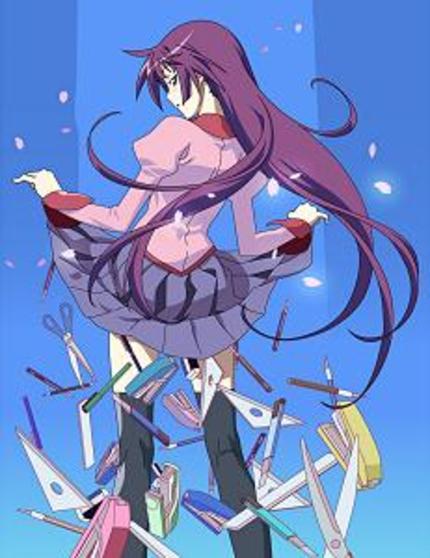BAKEMONOGATARI review

So Koyomi Araragi's this ordinary high-schooler, only one fateful night he's ambushed by a predatory vampire in an underpass and if it weren't for the sudden intervention of the mysterious stranger in his neighbourhood given to spouting sardonic witticisms about the occult he'd have been in real trouble, so now he's one-quarter bloodsucker with preternatural healing powers, mentoring under the mysterious stranger to pay back his debt, investigating his classmates' run-ins with the paranormal.
And all that gets set up in the time it would have taken most series to run their opening credits.
Bakemonogatari ('ghost/monster stories'), adapted from the light novels by Nisio Isin, is a show bursting at the seams. It's well aware of genre conventions - there's an extended panty shot only seconds into episode one - but it's toying with them, revelling in wordplay, in-jokes and running its fingers along the fourth wall.
The production design draws heavily on artist Vofan's original illustrations for the light novels - this is a distinctive, eye-catching world of layered silhouettes in soft pastel colours, using minimal animation, staccato cutting between still frames and copy and paste to sly, humorous effect (like the running visual gag that every car looks exactly the same). Studio Shaft are obviously angling to save money, but it's done so neatly it rarely becomes an issue - Araragi's errant plume of hair mirroring his emotional state, or psychedelic colour changes camouflaging some truly gruesome violence later in the series. Few shows in recent years have played so strongly to the limitations of the medium.
Which is not to say Bakemonogatari is ever less than visually inventive. Stop-motion collages, live-action models and super-deformed characters all crop up but the standout feature is undoubtedly the wordspam peppering every episode, passages from the novels flashed rapid-fire in between shots like a soundless inner monologue. Even subtitled, the effect is (literally) staggering, almost synaesthetic - sometimes played for laughs, sometimes ramping up the atmosphere.
At the same time Bakemonogatari is very much pitched totally straight. For all the rampant self-indulgence, every story arc is a neat, succinct and often startlingly emotional exploration of someone's pain, and how Araragi can't stop himself from trying to help them, even if it's not always in his best interests.
There's even an odd restraint, even maturity, in some of the most blatant fanservice Shaft dream up. Troubled female lead Hitagi Senjougahara graces a shower scene as censor-baiting as they come, yet her lack of concern with her own nudity is a world away from the tropes of the stereotypical harem series.
The camera keeps drifting back to her, naked or semi-clothed, again and again but the way in which she taunts Araragi is characterised far more as dry amusement at - and later genuine, grudging admiration for - his innate goodness rather than yet another succubus with a one-track mind. And yes, there's pain there, too; Senjougahara's problem (the subject of the first story arc) is she's nearly weightless, her mass a fraction of what it ought to be. 'Now you're just showing off,' Araragi accuses her. 'I'm just not good at wearing clothes,' she corrects him quietly. 'They're too heavy.'
At the same time the constant sense the show is largely preaching to the converted - clichés are clichés to some extent, regardless of whether they're being sent up - does make for heavy going. Viewers with little tolerance for anime excess could well find the opening arc a turn-off, and it doesn't exactly let up - on top of acres of skin there's over-sexualised under-age characters, lipstick lesbianism, shrill, hyper-speed Japanese pop music, occasional showers of gore and more besides.
Some will take such a list as a ringing endorsement, others will probably flee in terror. It bears noting Shaft never allow any of this to drive the narrative, though. Anyone looking to be pandered to outright is probably going to leave disappointed. The genre elements are always part of the dynamics - for every wink to the audience, every popcorn moment there's a scene of quiet introspection, artistic beauty or clever verbal sparring and they're all just as effective.
Araragi is a likeable, admirable lead for all his naivete, and he and his friends readily invite the viewer's empathy without (or despite) mugging for the camera. We care whether their problems get resolved, and where his relationship with Senjougahara is headed (yes, a couple in a shounen series who - for all their lunatic idiosyncracies - openly confess their feelings, actually talk things through and plan for the future!).
Ultimately, for such an utter fantasy Bakemonogatari feels strikingly human. The self-indulgence is undeniably part of the appeal - the show is hugely entertaining and frequently very funny - but for all it can be wickedly crass it also displays subtlety and a kind of grace lacking from far too many mainstream productions.
Ignored by distributors at the time of writing, currently only available on (non-English friendly) Japanese DVD and Bluray or fansubtitled digital release, for any anime fan after something playful or experimental - a portmanteau of witty short stories, beautifully drawn and scripted with genuine heart - Bakemonogatari comes hugely recommended.
















